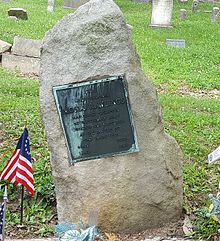Moses Rawlings
| Moses Rawlings | |
|---|---|
 |
|
| Born | 1745 Ann Arundel County, Maryland |
| Died | 1809 Hampshire County, Virginia (now West Virginia) |
| Buried | Rose Hill Cemetery, Cumberland, Maryland |
| Allegiance |
|
| Service/branch | Continental Army |
| Years of service | 1775 - 1779 |
| Rank |
|
| Unit | |
| Commands held | |
| Battles/wars | |
| Other work | State Commissioner of Prisoners in Frederick Town, MD |
Moses Rawlings (1740–1809) served in the Continental Army during the American Revolutionary War, most notably at the Battle of Fort Washington. He attained the rank of lieutenant colonel before leaving the military in 1779. He later served as the State Commissioner for Prisoners in Maryland.
Rawlings was appointed as first lieutenant in Capt. Michael Cresap's Independent Rifle Company from Frederick County, Maryland. Shortly afterward Cresap died, and Rawlings replaced him as company commander. On June 17, 1776 the company was joined to the newly formed Maryland and Virginia Rifle Regiment and Rawlings was named second-in-command and promoted to the rank of lieutenant colonel. When the regimental commander, Col. Hugh Stephenson, died in August 1776 Rawlings took command of the regiment. The unit consisted of approximately 250 rifelmen, and was often referred to as "Rawlings' Regiment".
During the Battle of Fort Washington the Maryland and Virginia Rifle Regiment was positioned about a half mile north of Fort Washington on Manhattan Island. From November 2 to November 14, 1776 they defended against German Hessian mercenaries, but on the 16th they were finally pushed back to Fort Washington, which surrendered a short time after. Rawlings was taken prisoner, but escaped. General Washington had also requested that Rawlings be released as part of a prisoner exchange.
Throughout the remainder of his military career, Rawlings often wrote to Washington concerning pay for his soldiers and recruits, as he had difficulty paying his soldiers. Washington's response often included requests that Rawlings use his own money to pay his soldiers until more money could be obtained from Congress.
In 1779 Rawlings became the State Commissioner of Prisoners out of Frederick Town, Maryland.
Rawlings was married to Elizabeth McMahon. He also had a son named Moses Rawlings.
...
Wikipedia
